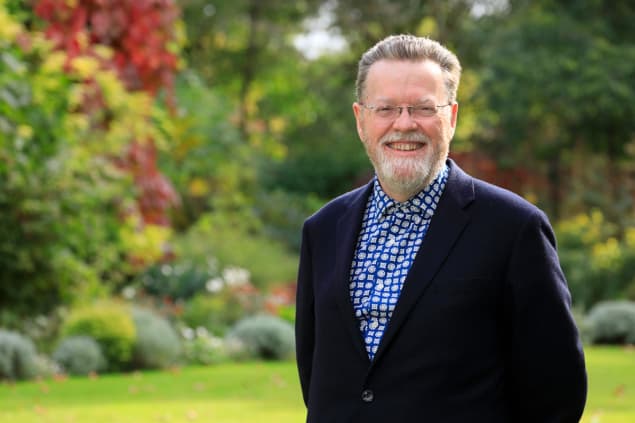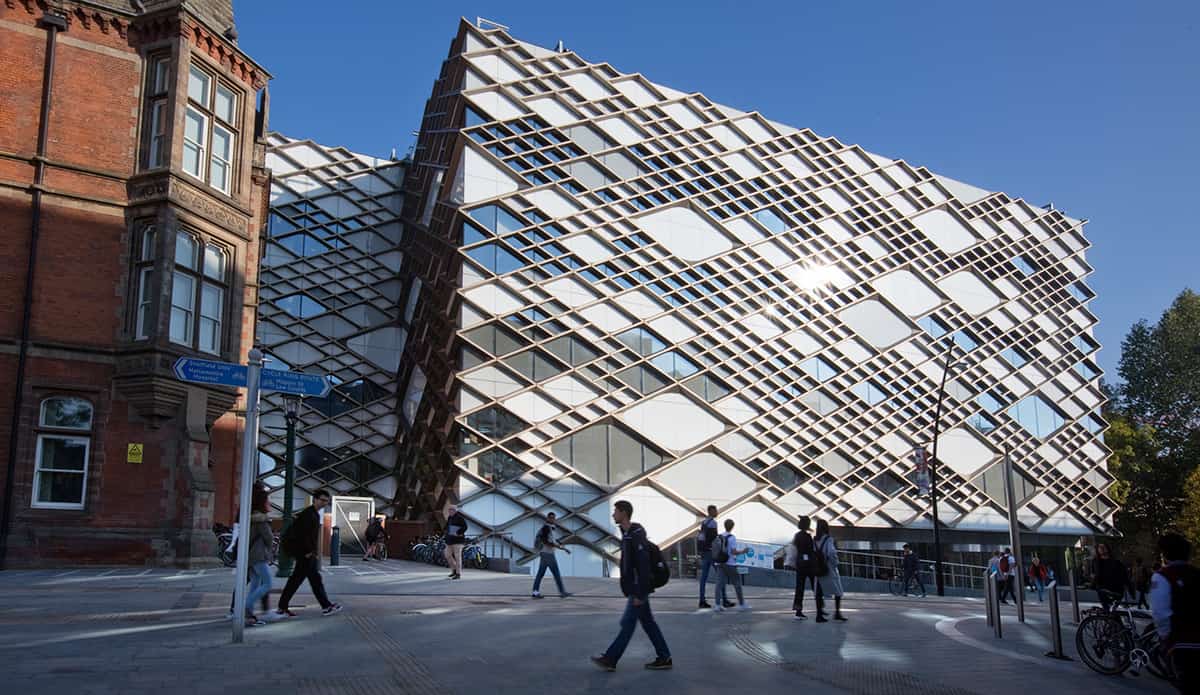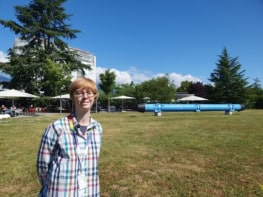Keith Burnett, the current president of the Institute of Physics, talks to Matin Durrani about his career in physics, the value of universities to a modern economy and how the IOP’s new strategy seeks to make physics open to all

Founded in 1920, the Institute of Physics has had some high-flying presidents over the years. Early luminaries included Ernest Rutherford, J J Thomson and Lawrence Bragg, while more recently the presidency has been held by the likes of Jocelyn Bell Burnell, Julia Higgins and Sheila Rowan. The current incumbent is Keith Burnett, an atomic physicist who spent more than a decade as vice-chancellor of the University of Sheffield in the UK.
He studied at the University of Oxford and worked at the University of Colorado at Boulder and Imperial College London, before returning to Oxford, where he was head of physics in the mid-2000s. But despite a career spent almost entirely at top universities, Burnett is not a distant, elite figure. He grew up in the valleys of South Wales and revels in the fact that his cousin Richie Burnett was World Darts Champion in 1995.
Physics World caught up with Burnett to find out more about his career and vision for physics.
What originally sparked your life-long interest in physics?
I grew up in a mining valley in South Wales, which was a wonderful place with a really cohesive community. It was at the time of the Apollo space programme – oh my god, the excitement. You could see the possibilities and I was fascinated by the idea of space. But one thing I did have was a wonderful teacher in school – Mr Cook. Also, my father worked for a small engineering company that made ceramics. So I just loved the idea of science from the very beginning.
You went on to study at Oxford, where you did a PhD in atomic physics. What attracted you to that field?
I had absolutely wonderful undergraduate lecturers and teachers – one being another Welshman, Claude Hurst. There was also Colin Webb, who later started Oxford Lasers. He was an amazing undergraduate teacher at Jesus College and he really inspired me. In fact, he then passed me on to one of his buddies, Derek Stacey. The group had been founded by Heini [Heinrich] Kuhn, who was an emigré scholar from Germany, and had a wonderful tradition in precision atomic physics.
Did the commercial side of physics ever appeal in terms of your own career?
Not so much, but I did really admire what Colin was doing because he was very early in terms of commercialization. People wanted the type of excimer lasers he was making in the lab. In fact I just got an e-mail from him. He’s retired but very pleased that Oxford Lasers has won a good contract for doing semiconductor work. So I very much admire the applications of lasers and optics.

Coldest: how a letter to Einstein and advances in laser-cooling technology led physicists to new quantum states of matter
You were around in the 1990s at the time Bose–Einstein condensation was first observed in the lab. It was a peak period for atomic physics wasn’t it?
I was actually on the search committee that hired Carl Wieman to [the University of Colorado at] Boulder, where I was an assistant professor at the time. Carl joined the faculty and worked with Eric Cornell to make a Bose–Einstein condensate. I was tracking that very closely. It was an absolutely wonderful time because it went from “No-one thinks you can make it” to “Maybe they’ve made it” and then “Wow, it’s really big and juicy and we can do great stuff with it.”
Would you say Eric Cornell and Carl Wieman were worthy winners of the Nobel Prize for Physics in 2001?
Yes. They won it with Wolfgang Ketterle. It was a remarkable story with twists and turns because the person who developed the ideas behind [laser] cooling was Dan Kleppner at MIT. He was the first to develop hydrogen cooling with Tom Greytak. But what is really important is that the people at MIT taught other people elsewhere how to do it. Because of that, they progressed much faster and were able to learn from one another. It shows that if you don’t have trust and the ability to exchange ideas, everything slows down.
My cousin Richie was World Darts Champion in 1995. He’s the really well-known Burnett in the valley. Not me!
Keith Burnett
After spells at Imperial College and then back at Oxford, you became vice-chancellor at the University of Sheffield. How did that come about?
I was about 49 when they said “Will you be head of physics at Oxford?” And I thought “Yeah, that’ll be amazing!” So I did that and it was very perplexing but wonderful – an amazing department. I did that for a year. But the person who inspired me [to move to Sheffield] was actually an ex-president of the IOP – and the previous vice-chancellor of Sheffield – Gareth Roberts [who died in 2007]. He’s another Welshman, though from north Wales, which is very different from south Wales – they play soccer, not rugby – but still Welsh. I was very poor at rugby. But my cousin Richie was World Darts Champion in 1995. He’s the really well-known Burnett in the valley. Not me!
So what did Gareth Roberts say to you?
Well, I’d worked with Gareth at Oxford and he said “You should really think about it.” Sheffield is a city bathed in the traditions of making steel and metallurgy. So I thought I would love being part of the civic life of the city. I also felt this was a university that does wonderful things for its citizens and students. The other thing is that my daughter had gone to Sheffield before me – she’s an architect there so I always say I follow in my daughter’s footsteps.
As vice-chancellor at Sheffield, you were firmly opposed to the principle of student tuition fees. Why was that?
Higher education is not just for the individual. It has consequences for society and for business too. If you say “No, it’s just an individual choice whether someone goes to university and pays a fee”, well that can work to a certain extent. But you cannot then be sure you’ll have enough scientists to work in, say, industry or defence. As a country, we used to roughly balance the system in terms of where people went. But now it’s a free-for-all in terms of choice, which is bad if we need more people in science and engineering. Tuition fees also fundamentally change the relationship with students. I disagreed with fees when they came in and I still disagree with them now.
The UK university sector has expanded hugely over the last 20 years thanks to a huge rise in student numbers and the trebling of tuition fees in 2012. Has that been good or bad?
The big thing that happened during my time at Sheffield was the increase in student tuition fees [to £9000]. I was very much against the increase, which wasn’t a popular [position to hold] among many of my vice-chancellor colleagues. In fact, I remember being pressured by Number 10 to sign a letter with other Russell Group universities to support the rise. I knew it was going to be a major burden on households and we’re now in a situation where the UK has to write off £12bn [from students who never earn enough to pay their loans back]. We’ve got a very bad investment portfolio and the students have got debt. It’s been a disaster.

Tuition fees haven’t risen for more than a decade now and many universities have come to rely on the much higher fees paid by international students. How has the growth in foreign students affected the higher-education sector?
International student fees used to be a top-up. When I was at Sheffield, we used them to build a new engineering teaching lab, known as the Diamond. But nowadays the income from international students is pretty much built into the fabric – in other words, without their fees you can’t run a university. We have some amazing physics departments in this country, but the tap that feeds them is actually undergraduate physicists, cross-subsidized by international students, especially from business schools, international relations and engineering. As a country, we need physics properly funded and less reliant on foreign students.
If you look at a place like Sheffield, students bring enormous benefits – vitality, money, inward investment
Keith Burnett
The rise in international students has also played a role in increasing immigration to the UK. Where do you stand in that debate?
If you look at a place like Sheffield, students bring enormous benefits – vitality, money, inward investment. Others may say “No, we don’t like students taking accommodation” and things of that sort. If you talk to experts in immigration, it’s far more neutral than people think. But the whole topic is inflammatory and it’s difficult to get a balanced discussion of the advantages and disadvantages. There are, though, some incredible physics departments in the UK – look at the number of companies working with the University of Bristol in its quantum tech. This is a big potential business long term.
After Sheffield, you became involved in the Schmidt Science Fellows scheme – what’s that all about?
It was an idea of [the US computer scientist] Stu Feldman, a long-term confidant of Eric and Wendy Schmidt – Eric being a former chief executive and chair of Google. Stu said “There ought to be a way in which people, once they’ve done their PhDs, can think more broadly rather than just carrying on in a particular thing.” How, in other words, can we identify people across the world who’ve got fantastic ideas and then give them some freedom to move? So we – our team at Rhodes House in Oxford – select people with exciting ideas and help them choose where they might go in the world.
What’s your role in the scheme?
My job is to mentor researchers in making this transition. Initially, I did all of the mentoring but now I have some colleagues. It can be all the way from handling financial issues to dealing with principal investigators to writing faculty applications. Over the last six years we’ve helped about 120 people across the world in different institutions. Some are now in national labs, while others have set up their own businesses. For me, it’s the most wonderful job because I get to hear the issues that early-career scientists have, such as using machine learning in all sorts of things – imaging biomolecules, precision drugs, everything.
What are the main challenges facing early-career researchers?
First and foremost, salaries. I think we’re in grave danger of underpaying our early-career scientists. We also need to do more to help people with their work–life balance. The Schmidt programme does have generous parental leave. There’s also the question of supporting and promoting people who work in interdisciplinary areas.

In October 2023 you started your two-year stint as IOP president. What are your priorities during your term in office?
The IOP has just launched its new five-year strategy and the big focus is the skills base of teachers and researchers. First, are we helping teachers enough – the people who help people get into physics? We need a strong pipeline of talent because physicists don’t just stay in academia, they move into finance, industry, policy.
Second, we are very interested in influencing science – especially the green economy. We have to explain that it’s physicists – working with engineers and chemists – who are at the core of efforts to tackle climate change.
We’re also thinking more about how to make membership of the IOP more useful and accessible. It’s not arrogance to think that someone with an awareness of physics is just that much better prepared for lots of things going on in the modern world.

Institute of Physics announces ‘impact projects’ for 2024
How can members of the IOP get involved with helping put that strategy into practice?
Start by looking at the strategy, if you haven’t already. If you’re a member of a particular group or branch, then feed your ideas back to your representatives. Our influence as an institute is much more powerful if we’re the convenors and co-ordinators of a more general effort. We can’t do all the things, but our membership is big and strong. If you can’t find somebody, contact me.
You feel strongly about the need for the physics community to be more diverse. How do you see physics evolving and over the next few decades?
There’s a wonderful book, After Nativism, that just came out by Ash Amin, who’s a trustee of the Nuffield Foundation, which I chair. He argues that many of the things needed to make a just, equitable and diverse society are not being advocated, with many parts of society backing away from these issues. But the younger generation is utterly committed to a future that’s more just, equitable and diverse. They’ve grown up freer of prejudice but also used to discussing these things more openly. They’re not interested in many of the divisions that people would see in terms of labels of any sort. Any labelling of people due to race, ethnicity, sexual proclivity – anything at all – is an anathema and I personally find that inspirational. I really find that inspirational.
As a profession, we are a long way off equity and have great deficits in terms of inclusion
Keith Burnett
How can the IOP help with such issues?
One of the things that the IOP can do is say “Well, what are the advantages of a society of that sort?” Some people may accuse us of being a bunch of “woke liberals”. We’re not. We’re just people who believe in justice and equity in society. But we’re going have to work for it because, as a profession, we are a long way off equity and have great deficits in terms of inclusion. Going forward, we will have a younger generation who will care much less about these issues because they won’t see them. In fact, they’ll find it very strange that there was a time when the IOP didn’t represent society as a whole.
What are the benefits of a more equitable and inclusive physics community?
The advantages are huge. You know, if you exclude groups of people because of the labels you attribute to them, you’re “deleting” people who could be powerful, influential and helpful for physics. You’re just wasting people. I have this absolute commitment that the broader we are in terms of our people, the better, the more just and the more powerful we will be. I think our community wants that. Some won’t; some people might have a more traditional view of what society is. But it’s our duty and our incentive to say why we want a more just society – after all, it’s smarter, more powerful, more fun.
- To hear a full-length version of this interview, listen to the Physics World Weekly podcast of 15 March 2024



